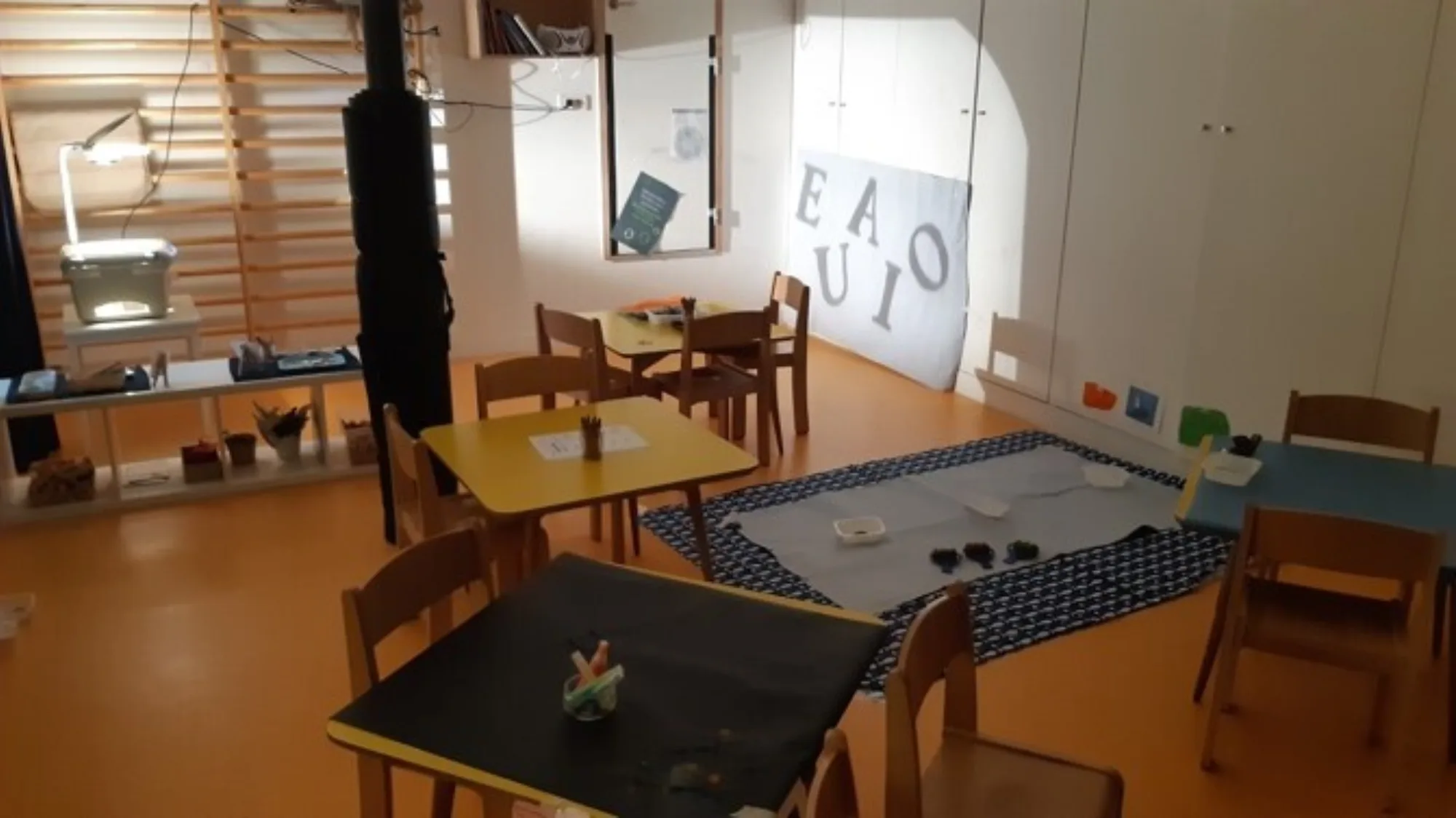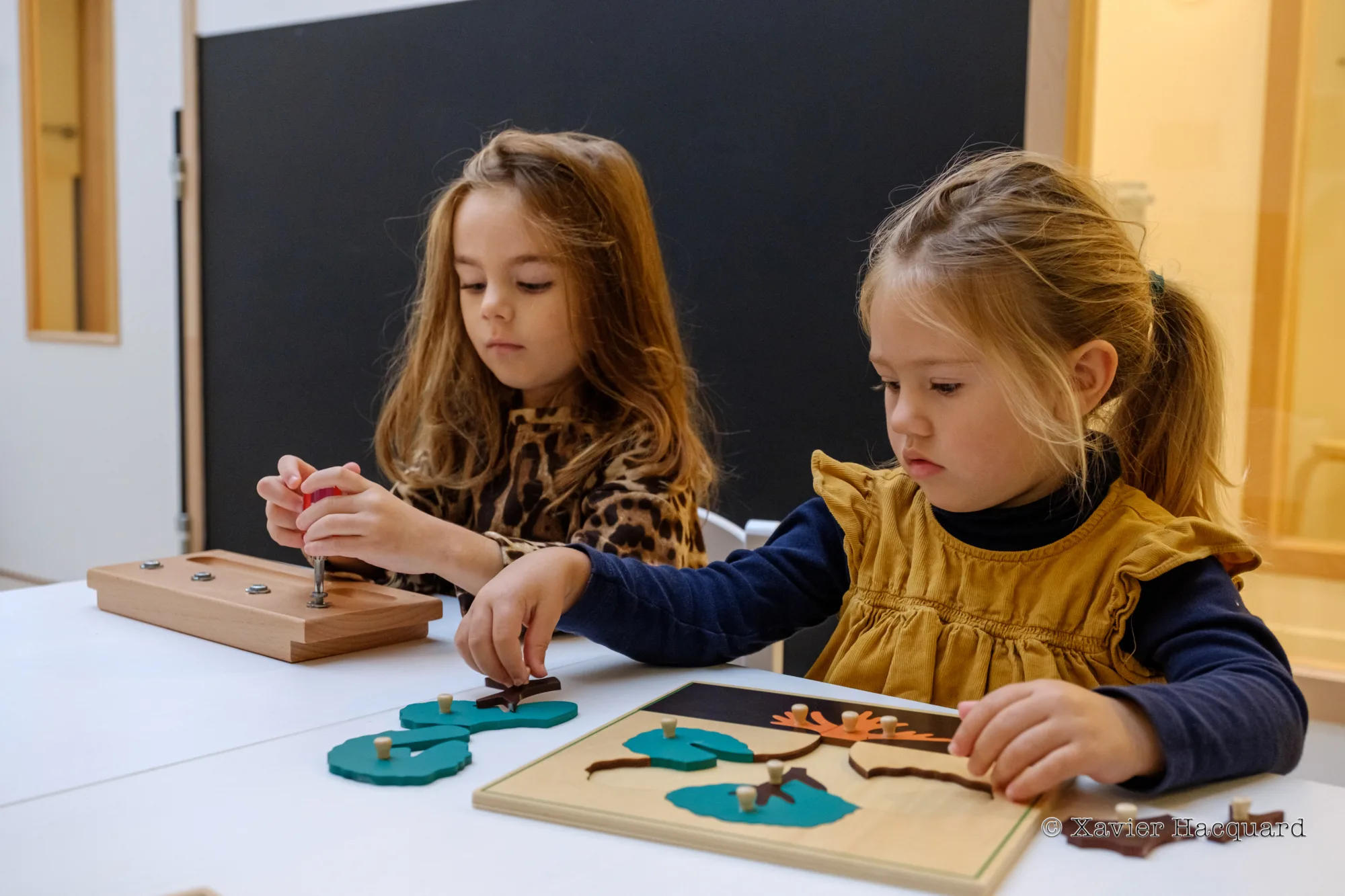Focus
Why do we use Montessori and Reggio Emilia?
In our Douces Maternelles schools, we choose to rely on two alternative pedagogies: the Montessori method and the Reggio Emilia approach.
Why alternative pedagogies? What are they?
At the heart of these pedagogies is above all the respect for the child and compassionate guidance.It's not just an occasional display of affection... No, it goes much further, and we all now know how crucial it is for a child to be listened to to instill confidence in themselves. The foundations of their well-being and development are laid from a very young age, so it is essential to respond by fostering learning opportunities and also by taking into account the specificities and strengths of each child.Every child should be able to express themselves, take their time, have "available" adults who are attentive and passionate. They should also have access to all the necessary and varied tools for their fulfillment, their development, to nourish their insatiable curiosity... The child should be able to act on their own, experiment, fumble, discover, make mistakes, and try again.These alternative pedagogies thus encourage the desire to learn!

Reminder of each approach specificities
The first one is now well-known throughout the world among early childhood professionals, teachers, and families who are increasingly attentive to the quality of education from kindergarten onwards, advocating for a privileged and unique support for each of them, and finally, the emphasis on experimentation and hands-on learning in all areas of learning.At Douces Maternelles, we use Montessori tools daily in cognitive, sensory, and practical life domains... The tools are carefully designed so that the child can work independently and correct themselves if they make a mistake.
The second approach is much less known in France, but it is more widely recognized in Anglo-Saxon and Nordic countries and, of course, in the region of Reggio Emilia in Italy.The Reggio Emilia approach, founded by Loris Malaguzzi, emerged in the city of Reggio Emilia at the end of World War II. It is entirely focused on the child and their interests. The adult is a co-learner alongside the child.It is based on strong values such as respect for the child, respect for the environment, and a close relationship between families, educational teams, and other stakeholders.
Common points
Both pedagogies share several aspects, particularly a respect for the child, the importance placed on experimentation, and the aesthetics and quality of the educational tools used by the children.The classroom atmosphere is also an important element in both pedagogies, ensuring that children find themselves in a serene, warm, friendly environment conducive to learning and exploration.That's why at Douces Maternelles, we offer living and learning spaces in line with these pedagogies. Beautifully designed schools, spaces tailored to each age group, friendly, bright, and serene living areas that foster both individual work and collective projects.The spaces are introduced to the children at the beginning of the school year and throughout the year to remind and identify each of them and their functions.
Differences that bring us together
It became apparent to us that these pedagogies were also different in many respects but that they could complement each other perfectly.Indeed, in a Montessori classroom, a child will primarily work alone on Montessori materials following a predefined and 'regulated' progression.While in the Reggio approach, it often involves collective projects conducted over a period more or less extended based on observation or a specific interest in the child. Thus, the teacher continues to learn based on the projects undertaken alongside the children. They must prepare and create environments conducive to deepening their knowledge of the project. The teacher in Reggio is always in 'research mode.' The proposals for tools and materials also evolve according to the project being carried out.In Montessori, it is a method that applies to all Montessori schools with tools that evolve according to the stages of development and the knowledge acquired by the children. The child will develop their knowledge and learning at their own pace by practicing with the tools provided. The child is encouraged to identify their mistakes themselves to continually progress.Reggio pedagogy is not reproducible because it is primarily based on the children's interests, which, of course, vary from one individual to another, from one situation to another, or from one environment to another. The goal is to connect all learning domains around projects where children can express themselves and all their curiosity. Imagination, creativity, hypothesis formulation, and experimentation are at the heart of this approach.The referring adults who accompany kindergarten children in Reggio schools are involved in the workshops and must propose workshops linked to and based on the child's interests. They develop workshops, both cognitive and other artistic, cooking, music, gardening, etc. In this regard, the educational teams at Douces Maternelles are always attentive to the questions, words, phrases, and observations uttered by the children throughout the day. This requires constant and heightened observation of each child to highlight their curiosity and respond to their requests in various areas.

Our approach at Douces Maternelles
We have thought and worked extensively on the best way to coexist these two pedagogies that seem to us today to be the most suitable and adjusted for the social, cognitive, and emotional development of the child.Our work and reflections continue every day to nourish us and fuel our proposals for supporting the child, the way we offer our various workshops, and projects. Both pedagogies allow putting the child at the heart of their learning. Each in its own way, and we take from each what we believe to be the most appropriate and suitable for our students, also considering the continuation of our little students' schooling.For all the reasons mentioned above, and because we strongly believe in the benefits and advantages of working in small groups, learning bilingualism as early as possible, and using adapted and evolving tools, it seems evident to us, especially in kindergarten when the child discovers the full potential of social relationships, to offer moments of individual work as well as to favor group work.To meet the end-of-cycle requirements for kindergarten, our teams follow the program of the Ministry of National Education while offering different teaching methods from traditional kindergarten. By inviting children as much as possible to express themselves, experiment, discover, and manipulate.For this, we provide our students with Montessori educational tools that are "careful", "beautiful," in good condition, and varied. For the Reggio approach, we always offer our students recyclable materials, a wealth of graphic tools, elements borrowed from nature, on shelves within their reach... everything that allows counting, observing, manipulating, comparing, touching, imagining, drawing...
Similar articles